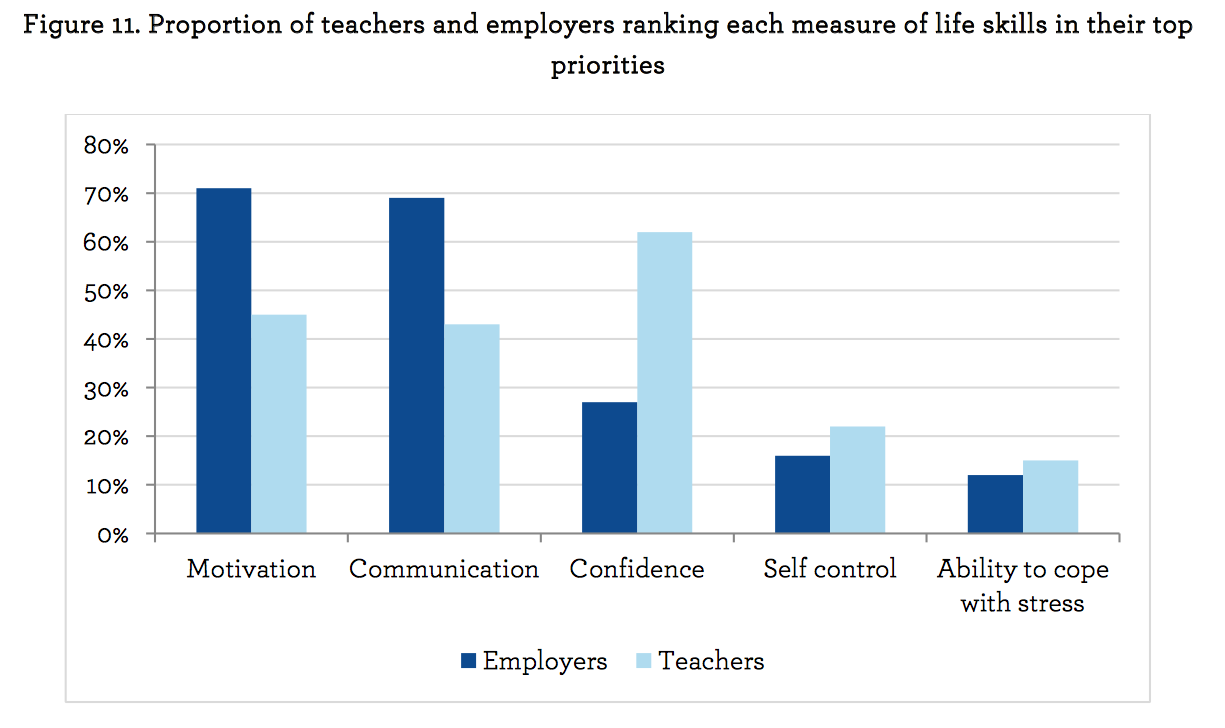The Sutton Trust report ‘Life Lessons, Improving essential life skills for young people’ (Oct 2017) makes interesting reading. There is much to discuss within its pages. One of the things that stood out for me is the need to teach written and spoken communication ‘skills’* including debate, argument, speech and the art of conversation.
When asked to rank motivation, communication, confidence, self control, ability to cope with stress into a rank order employers put motivation first, closely followed by communication ‘skills’ whereas teachers put a great deal of emphasis on confidence with communication ‘skills’ way behind in third place.

In the Oxford English Dictionary confidence is described as:
A feeling of self-assurance arising from an appreciation of one’s own abilities or qualities.
This implies that confidence arises from something rather than being a prerequisite for something. It is a quality gained from experience. It is not the same as self-esteem or arrogance, confidence can only come from a place in which one has experienced something and knows one can cope. Confidence comes from knowing one can do. Confidence that one can take a further step is due to having the prerequisite ability and knowledge so that a risk is worth taking – that everything is in place for them so to do.
Why did the teachers surveyed rate confidence so highly and the employers much less so? Maybe the term is meaningless as it can have a wide interpretation as to what it means in practice. But if we put this doubt to one side I feel there might be something worrying about the disparity between the two. Maybe the employers feel that someone who can communicate well can move into a new area (i.e. a job) learn about it and be able to communicate with their colleagues and customers effectively growing in confidence as they learn more. Whereas the teachers feel it is confident children who are more able to learn new stuff.
Yet we have already seen confidence comes from learning rather than the other way round.
And some of the areas of knowledge teachers can teach children successfully is how to communicate eloquently and beautifully. I would be much happier if the graph showed the majority of teachers rating communication above confidence. Way above confidence. Because teachers can teach rhetoric, the whys and wherefores of debate and the knowledge necessary for a pupil to know what they are talking about. Teachers can teach knowledge and get their pupils to really grapple with that knowledge through argument and conversation. And through this children’s appreciation in their abilities will grow. In other words they will become more confident because of good teaching.
The urgency comes in with the realisation that there is a social justice angle to this.

70% of the least disadvantaged get access to debating, whereas this falls to just over 30% for the most disadvantaged. Importantly, this is about the provision, it doesn’t reflect the take up. The Sutton Trust estimate that:
Young people in the most disadvantaged schools are 13 percentage points more likely to not be involved in any extra-curricular activities than the least disadvantaged schools (45% compared to 32%).
And that take up in schools for extra curricular activities is difficult to judge accurately in the first place. They also suggest that pupils in ‘disadvantaged schools’ are less likely to debate in class and learn how to make speeches and, indeed, write those speeches. And yet it is by learning these essential academic skills that pupils can grow in confidence. Confidence – the life ‘skill’ that, apparently, teachers most value.
Wouldn’t it be great if pupils in ‘disadvantaged’ schools had access to the full range of academic opportunities that come from learning how to communicate their learning effectively?
The spoken word is one of the ways teachers can assess the quality of learning easily and efficiently. It would be a shame if another gap between rich and poor is one of eloquence and whether a pupil is able or unable to join in with the great conversations of our time with confidence.
*I use the word ‘skills’ advisedly in the context of the report calling them ‘skills’. One could argue that the art of communication is about knowing what and how. For e.g. one can learn the art of rhetoric – it is a body of knowledge.
Leave a comment